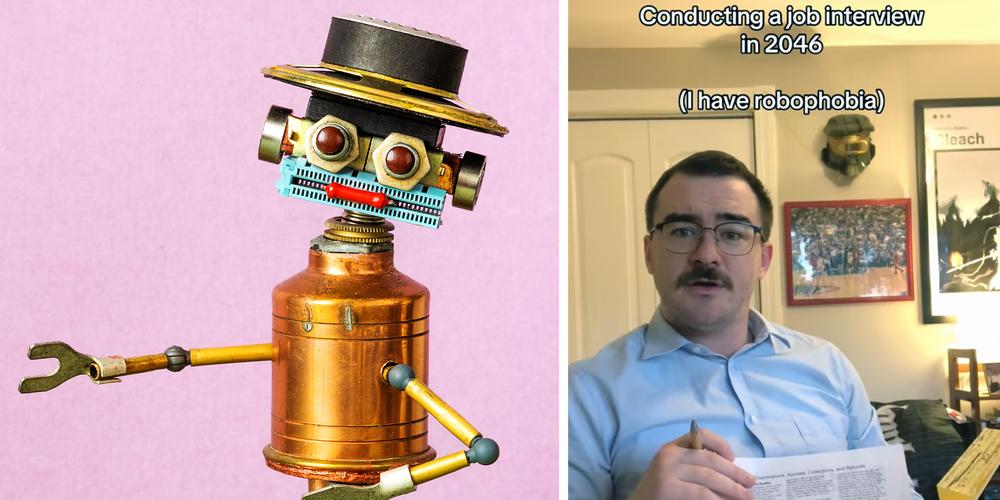Videos featuring people roleplaying robophobic scenarios have gone viral across TikTok and beyond, drawing comparisons to real-world hatred and discrimination.
The trend first emerged in early to mid-2025 as TikTokers roleplayed disapproving elderly relatives meeting their grandkids’ robot partners, biased job interviews, and other everyday events in an imagined future dominated by artificial intelligence.
Many use AI slurs like “clankers”, “wirebacks,” and “tinskins.” Although creators claim their videos are a lighthearted way to poke fun at present fears around AI, the historical parallels are blatant—leading some to question if robophobia is an excuse to roleplay racism.
What is robophobia?
Robophobia, or prejudice towards robots and artificial intelligence, has long existed as a concept in science fiction, with words like ‘skinjob’ being used as pejorative terms in media like Blade Runner and Battlestar Galactica.
AdvertisementThe most prominent of these slurs is “clanker”, which itself originates from a 1958 article by William Tenn, but was popularized by Star Wars: The Clone Wars, where it is used to discriminate against droids. At some point in late 2024, it reentered the internet lexicon as a slur used towards AIs, at first tongue in cheek, but likely fuelled by real-world fears like the dead internet theory, and general disapproval of AI slop.
By mid-2025, the use of the term clanker and talk around robophobia in general had grown. This ultimately inspired a TikTok trend in which people would perform short skits as their future selves or other characters being “robophobic” in the future—acting out everyday situations in a world where robots and humans coexisted, but one where older members of society in particular were having a harder time adjusting.
What is the TikTok trend?
One notable example is this video, by user joshbensontherapper, which has over 5.9M views as of Oct. 13. Text on screen reads, “Talking to my grandchildren in 2085 (I’m insanely robophobic)”, as Josh plays the role of an old-fashioned, prejudiced grandfather.
Advertisement“Caitlyn, are you still dating that dirty clanker?,” he asks in a Southern drawl. “Oh, Grandpa, you’re not supposed to use that word,” his granddaughter replies before he retaliates, “What, I can’t speak my mind anymore?”
“Yes, Grandpa, I’m still dating RX4317 because I’m AIsexual,” she adds, leading the grandfather to reply, “Should I put my toaster away then?” The video ends with him using further slurs against robots, including “tinskins” and “spark donkeys.”
People in the comments seemed to be on board with the AI hate, expressing anxieties around a future where things like dating AI could become a widespread reality and praising the skit as an accurate commentary.
@joshbensontherapper Spark donkeys is my new fav #clankermemes #clanker #clankers ♬ original sound – Josh BensonAdvertisement
“We laugh at it now, but people may become like this,” wrote Alex Ferren.
“The way this could actually be our reality is terrifying,” added Rosie.
Another popular skit centers around a job interview, with the interviewer heavily biased against the robot candidate.
@football_drew Robophobia running rampant in clanker society #robot #robophobia #fyp #fypage #ai #clanker #robo ♬ Dust Collector – ybg lucasAdvertisement
“Clanker scum,” someone commented while another added, “Not the hard R.”
The parallels with real-life hate towards marginalized communities were apparent to many in the comments—with some seeing this as a self-aware part of the joke—and others understanding its more serious implications.
“Divided by melanin, united by skin,” someone said.
“It’s funny, but c’mon, guys, let’s not play into it too hard, it’s giving thinly veiled racism,” wrote KommandentSpark.
AdvertisementThe trend evolves, and people have thoughts
Heavy Southern accents, refusing to serve robots in restaurants, dressing up as policemen and removing ‘clankers’ from buses—the parallels are so obvious to be egregious, harking back to the Civil Rights Movement, Jim Crow laws and Black Lives Matter, with some skits even mentioning “Rosa Sparks” and “George Droid.”
It’s something that has not gone unnoticed online. Black creator @supervillainsprax shared his thoughts in a reaction video on TikTok about how the initially innocuous social commentary had gone too far, calling it “stealth racism.”
Advertisement“It’s kind of natural for people to draw from the biggest resource pool that is there; hell, some black creators were doing it,” he explained. “But when you start getting to the point of straight up cosplaying the Antebellum South to do it, especially as a white woman, at some point people are gonna ask where does the satire end, and the messaging begin?”
@supervilliansprax #stitch with @Stanzi Clanker Jokes are jokes until they aren’t anymore #clankermemes #politicalsatire #politicstiktok #blacktiktok ♬ Dark Western – Gary O’Slide
People on Reddit also questioned the uncomfortable comparisons.
“Does Clanker kinda rub anyone else the wrong way?” u/Informal_Radish_1891 asked 3 months ago on the r/blackladies subreddit.
Advertisement“The term itself is stupid, but I’ve 100% already seen people comparing it to the N-Word, or a ‘slur’ they can use without repercussions,” someone replied. “It’s not just you, the vibes are off.”
What do experts think?
Professor Moya Bailey from Northwestern University, who specializes in race and gender representations in media, agreed, telling Wired that she believed the skits were an excuse for many to joke about racism.
Advertisement“I think the folks that go that route of racist humor honestly wanted an excuse—and it’s a pretty good one—to make some jokes that I think they just wanted to make and felt clever in making those connections,” she explained.
As well as pointing out the obviously insensitive historical context around the jokes, others questioned whether they were a slippery slope towards normalizing hatred and discrimination towards marginalized communities in general, seeing AI as an acceptable group to express this towards.
“Man I was thinking this too, besides being an AI rights advocate, for the present it’s kind of messed up because it kind of gives people a sense of comfortability saying essentially a slur casually, you see the slippery slope there?” commented Madamadam158 on Reddit.
Many creators have defended their skits, feeling that they are not that deep and nothing more than a satirical reaction to fears around AI in the current climate. And it’s true, negative sentiment around AI is growing: with AI art seen as wasteful, chatbot girlfriends seen as cringe, and advertisements like the recent Friend.com subway campaign subject to derision and ridicule.
AdvertisementBeing anti-AI is also, for many, a political statement, with podcast Never Post questioning whether the AI-generated art is now associated with fascism. So it’s understandable that people are experiencing real robophobia, to some extent. But playing into age old stereotypes and directing that hatred back towards marginalized communities doesn’t solve the problem.
Advertisement
 Ukraine war latest live: Kyiv denies Pokrovsk encirclement again, admits logistics difficult
Ukraine war latest live: Kyiv denies Pokrovsk encirclement again, admits logistics difficult